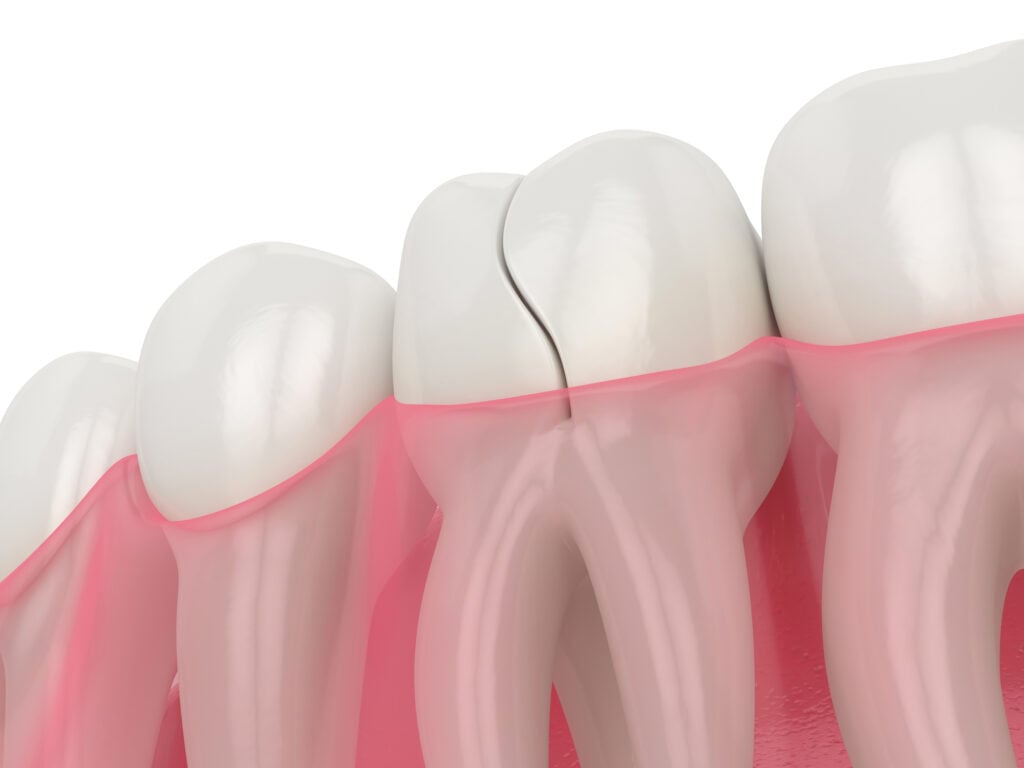Sometimes you might wake up with a sore tooth and feel a sudden jolt of pain whenever you bite down on something. When that happens, you might wonder if your tooth is cracked or just sensitive.
A cracked molar can not only affect your quality of life, but it can also lead to worse dental problems in the future. We'll help you figure out the signs, treatment options, and costs of cracked molars.
What Causes a Cracked Molar?
That unexpected jolt of pain in your back molar often happens when you bite into something harder than expected. However, your molars can crack for a multitude of reasons, including:
- Biting or chewing on hard candies, nuts, ice, and non-food items
- Teeth grinding (bruxism)
- Untreated tooth decay
- Previous dental work, such as large fillings or restorations, can compromise your tooth’s structure, making it more prone to cracks
- Trauma or injury to the mouth
- Sudden exposure to very hot or cold food
- Genetic factors can increase your risk of tooth decay or lead to weaker tooth structure
Additionally, your teeth can wear down over time and weaken as you age. This makes them more susceptible to cracks.
If you suspect a cracked molar, it's important to see a dentist promptly. Early intervention can prevent further damage and complications like infections or tooth loss.
What are the Most Common Types of Cracks?
A cracked molar can have different types of cracks, some of which may require specific treatment methods. These include:
- Cracked teeth — Cracked teeth may require a dental crown. A root canal may be needed if the crack goes beyond the enamel into the pulp.
- Craze lines — This type of crack is minimal and typically only requires polishing.
- Fractured cusp — This type of crack often requires an onlay or crown.
- Vertical root fracture — These are serious dental problems and may require extraction.
- Split tooth — A significant crack that often requires extraction and implant placement.
What are the Symptoms of A Cracked Molar?
The most common sign of a cracked molar is a quick, sharp pain when you bite down or release pressure. However, it can also have other symptoms, such as:
- Sensitivity to hot and cold foods or drinks
- Swollen gums
- Pain that comes and goes
- Food getting caught when eating
- A hole or crater in the tooth (possible sign of decay rather than just a crack)
- Dark or discolored teeth
- Infection or abscess
You should immediately call a dentist if your pain lasts more than a couple of days or worsens over time.
What Can Happen if a Cracked Molar Isn’t Treated?
Without proper treatment, a cracked molar can lead to tooth loss. If ignored, a crack can quickly lead to permanent nerve damage and the need for more extensive treatment.
Tooth‑pulp inflammation can develop over several days (and sometimes longer) after a crack forms, gradually leading to mild or moderate pain. After several days, untreated inflammation can worsen, leading to severe pain and infection.
A small fracture may not need significant treatment initially, but it can lead to extensive and costly dental care if left untreated. A larger cracked molar can lead to pain, infection, and tooth extraction.
How are Cracked Molars Treated?
When it comes to permanent solutions, treatment depends on the crack's depth, your tooth’s condition, your age, and overall oral health. Your dentist will recommend one of these evidence-based treatments:
- Dental bonding — For shallow, minor cracks, tooth-colored composite resin can seal and protect the tooth.
- Onlay restoration — Moderate cracks affecting one cusp typically respond well to this less invasive option.
- Dental crown — Deeper, more extensive cracks require a crown to hold the tooth structure together, significantly reducing the risk of further damage.
- Root canal therapy (RCT) — If the nerve inside the tooth has been affected, an RCT followed by a crown can save your tooth from extraction.
- Extraction and implant — If the tooth is severely fractured or split, extraction and replacement with an implant may be necessary.
Your dentist will carefully assess the crack and discuss these options, so you understand your best path forward.
How To Prevent A Cracked Tooth?
After fixing your cracked molar, safeguarding your dental health becomes even more important. These proactive steps can prevent future tooth damage:
- Night guard — If you grind or clench your teeth at night, a custom-made guard protects your teeth by evenly distributing bite forces.
- Mind what you eat — Avoid chewing ice, popcorn kernels, and other hard items. Cut fruits carefully, and never use teeth as tools to open packages or bottles.
- Regular follow-ups — Keep your scheduled dental checkups—your dentist will ensure crowns or other restorations stay secure and intact, typically recommending a check every six months after major work.
- Maintaining your oral hygiene — Brush your teeth at least twice a day and floss regularly to prevent tooth decay or potential cracks.




